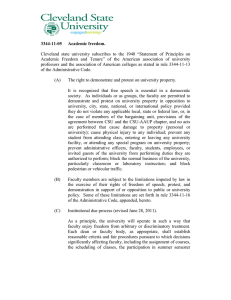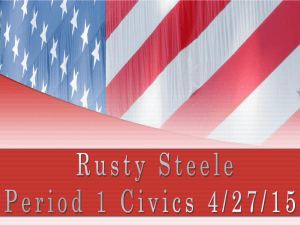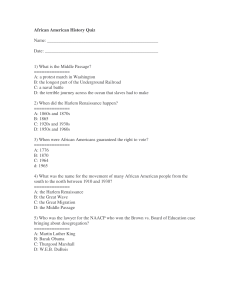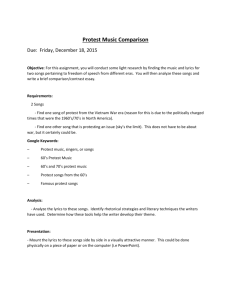Protest/Music in the Shadows of Home/Land/and Security
advertisement
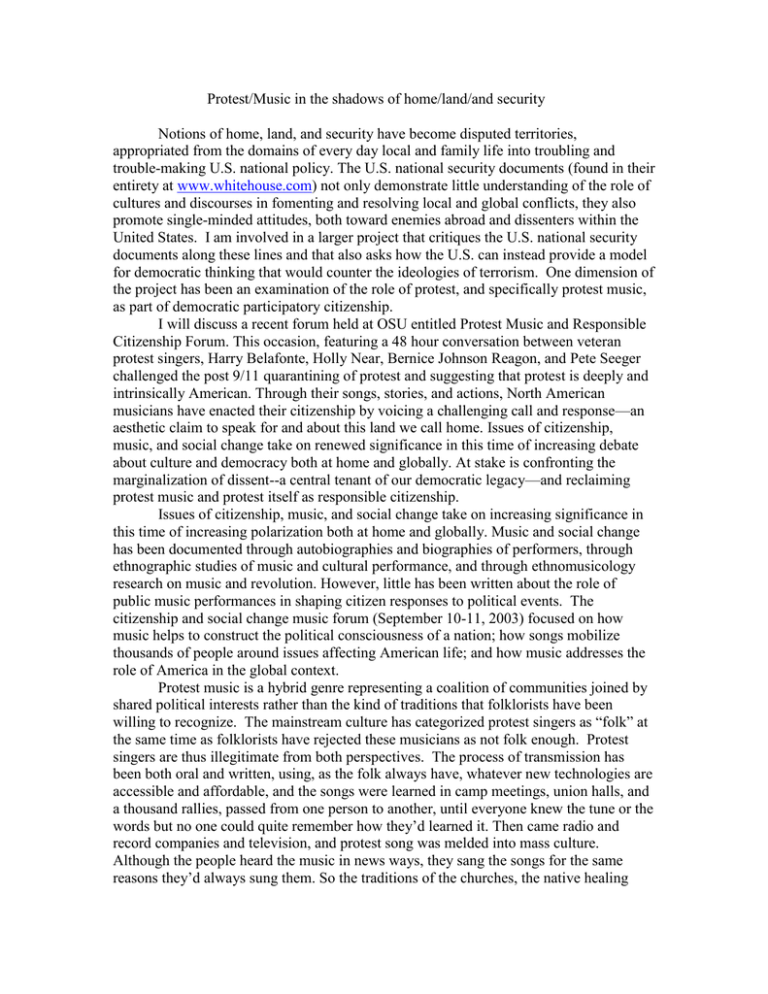
Protest/Music in the shadows of home/land/and security Notions of home, land, and security have become disputed territories, appropriated from the domains of every day local and family life into troubling and trouble-making U.S. national policy. The U.S. national security documents (found in their entirety at www.whitehouse.com) not only demonstrate little understanding of the role of cultures and discourses in fomenting and resolving local and global conflicts, they also promote single-minded attitudes, both toward enemies abroad and dissenters within the United States. I am involved in a larger project that critiques the U.S. national security documents along these lines and that also asks how the U.S. can instead provide a model for democratic thinking that would counter the ideologies of terrorism. One dimension of the project has been an examination of the role of protest, and specifically protest music, as part of democratic participatory citizenship. I will discuss a recent forum held at OSU entitled Protest Music and Responsible Citizenship Forum. This occasion, featuring a 48 hour conversation between veteran protest singers, Harry Belafonte, Holly Near, Bernice Johnson Reagon, and Pete Seeger challenged the post 9/11 quarantining of protest and suggesting that protest is deeply and intrinsically American. Through their songs, stories, and actions, North American musicians have enacted their citizenship by voicing a challenging call and response—an aesthetic claim to speak for and about this land we call home. Issues of citizenship, music, and social change take on renewed significance in this time of increasing debate about culture and democracy both at home and globally. At stake is confronting the marginalization of dissent--a central tenant of our democratic legacy—and reclaiming protest music and protest itself as responsible citizenship. Issues of citizenship, music, and social change take on increasing significance in this time of increasing polarization both at home and globally. Music and social change has been documented through autobiographies and biographies of performers, through ethnographic studies of music and cultural performance, and through ethnomusicology research on music and revolution. However, little has been written about the role of public music performances in shaping citizen responses to political events. The citizenship and social change music forum (September 10-11, 2003) focused on how music helps to construct the political consciousness of a nation; how songs mobilize thousands of people around issues affecting American life; and how music addresses the role of America in the global context. Protest music is a hybrid genre representing a coalition of communities joined by shared political interests rather than the kind of traditions that folklorists have been willing to recognize. The mainstream culture has categorized protest singers as “folk” at the same time as folklorists have rejected these musicians as not folk enough. Protest singers are thus illegitimate from both perspectives. The process of transmission has been both oral and written, using, as the folk always have, whatever new technologies are accessible and affordable, and the songs were learned in camp meetings, union halls, and a thousand rallies, passed from one person to another, until everyone knew the tune or the words but no one could quite remember how they’d learned it. Then came radio and record companies and television, and protest song was melded into mass culture. Although the people heard the music in news ways, they sang the songs for the same reasons they’d always sung them. So the traditions of the churches, the native healing grounds, the slave quarters, and the picket lines were carried forward to the streets of Birmingham and Seattle, to the struggle for women’s rights and gay rights, to defend the environment, to lobby for disability rights, and to reclaim the rights of workers in an age of global capital. And though the names and the styles and the language changed, the musicians were always there –from the Almanac Singers to Sweet Honey in the Rock to Rage Against the Machine-- sharing their songs with the people, calling for our nation to live up to the principles it so proudly proclaims. Protest music has been a profoundly Romantic and Romanticized movement; it’s an example of what Amy Shuman has called strategic Romanticism.” Participation in “people’s music” is strategically effective for creating oppositional political coalitions. In the shadow of September 11, many Americans have come to see protest as unpatriotic, dissent as sedition. The four musicians came together to discuss the role of protesting, not a threat but an obligation. We asked them to discuss how music helps to construct the political and moral consciousness of a nation, how songs move people to action, and how music addresses the role of America in the world today. We asked them to discuss how through their music they enact the fundamental principles of citizenship in democracy; a democracy protects the rights of those who sing in public. The citizen-artist or citizenmusician is one of the best examples we have of individuals acting in the interests of the community to promote free expression of ideas. For two days they grappled with questions such as how is protest singing a form of responsible citizenship? How do performers express their own responsible citizenship and how do they mobilize others to act responsibly? What do listeners experience? When they experience the solidarity of singing together, is that enough or does the singing experience translate into some impact on policy? How do we reclaim and refashion protest music as responsible citizenship in the 21st century? I include below a sample of quotes from various musicians on these questions. Visit our website for more information. www.roadworkcenter.org. This project expands on my larger study of disputed territory, which I define both as a geographical struggle over place and as a metaphorical way to understand conflicts that while encompassing dimensions of place, play themselves out in terms of gender, class, sexual identity, and the body. Elements of a concept of folklore as disputed territory can be found in Roger Abrahams essay, “Shouting Match at the Border,” in Dan Ben-Amos’ theory of ethnic genres, and in Barbara Kirshenblatt-Gimblett’s concept of destination culture. In my work, I have examined both the geographic and the metaphorical dimensions of contested space and disputed territory. For example, in my study of Zehava Ben, a Moroccan/Jewish/Israeli singer of (among other repertoire) Arab music, I looked at the ways music crosses enemy lines in the context of a national struggle. In the protest music project, disputed territory is located on U.S. ground and is a subject of the songs as well as performance and representation issues. As Woody Guthrie’s song, “This Land is Your Land, This Land is My Land,” suggests, the questions include who gets to give voice/represent the homeland. "The artist must elect to fight for freedom or slavery" - Paul Robeson “Music has a role to play in spreading the word of peace. I think it is a case of using music to articulate something that you don’t find articulated in the mainstream media. The most important thing it does is create a community of dissent: you realise you are not the only person who feels completely opposed to the war. Or, there are a lot of people out there who feel ambiguous about it, and hopefully coming along to a march or hearing the songs might help them to make a conscious decision to oppose the war. That is the experience that I have had.” Billy Bragg “I believe our collective safety as a people on this planet will come from calling on our finest, culturally informed world negotiators, facilitators, mediators and artists to lay the ground work for trust, civility, and peace. And if our leaders do not know how to take this path, then we, the people, have the historical and constitutional right to do so. It is not a stand against one's country to take a vigilant stand for peace.” Holly Near Part of being an activist is remembering to tell each other the truth even if the media won’t. That is why community is important. We need to tell each other the news. One person tells one person tells one person. In that way, we do not fall prey to the news as those in power want us to receive it. Holly Near “Now somebody will as me, ‘Pete, how can you prove these songs really make a difference? And I have to confess I can’t prove a darn thing, except that the people in power must think they do something, because they keep the songs off the air.” Pete Seeger “I had thought that folk music was something old, back in the library, and pop music was new--it was something you could hear on the radio. All of a sudden I realized that was a phony distinction. Millions of people were making music which grew out of the old traditions, mostly making up new words to fit old tunes. New words to fit new circumstances. This is what I call the folk process” Pete Seeger “Songs are funny things. They can slip across borders. Proliferate in prisons. Penetrate hard shells. I always believed that the right song at the right moment could change history.” Pete Seeger We felt it was important to comment on where the US appears to be heading now. A war in Iraq will not resolve our problems. It can only result in the deaths of many innocent civilians and US troops. If we are truly striving for safety, we need to build friendships, not try to bully the rest of the world." - Mike D and Adam Yauch, The Beastie Boys "I definitely think the farty old left is as much an enemy as the conservatives in power, as far as turning people off to activism and change. Resistance should be fun. Resistance isn't some pain in the ass; it's great fun. It's not just good for the soul, and uplifting spiritually; it can also be a great kick in the ass. " Jello Biafra, former singer of the Dead Kennedys "I love America more than any other country in this world, and, exactly for this reason, I insist on the right to criticize her perpetually." - James Baldwin, _Notes of a Native Son_ "True patriotism hates injustice in its own land more than anywhere else." Clarence Seward Darrow (19thc American Lawyer) "When we lose the right to be different we lose the privilege to be free" - Charles Evans Hughes (US Supreme Court Justice) "I went to a mass meeting and I was hoarse because I sang all the time in the jail. I opened my mouth to sing... I never heard that voice before. It was very similar to the way people describe religious conversion. There is actually a song that says: 'I looked at my hands, and my hands looked new. I looked at my feet, and they did, too. I started to talk, and I had a new talk. I started to walk, and I had a new walk.' For the first time I really understood what was in that singing that I had heard all my life." - Bernice J. Reagon
